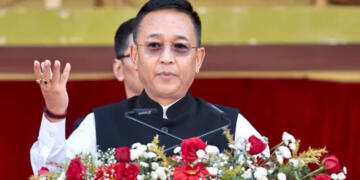The Union Government is on a spree to bring about radical improvements in the lethargic bureaucracy of the country. On Wednesday, the cabinet announced Mission Karmayogi–a unique skill-building programme for civil servants across the country that will help training the officers to meet the challenges of the society. Spearheaded by Prime Minister Narendra Modi, a council will approve the capacity building plans for civil servants or often they are called, the ‘babus’.
Officially called as the “National Programme for Civil Services Capacity Building”, Mission Karmayogi plans to transform human resource management in the country. The aim is to form a ‘roles-based system’ instead of a ‘rule-based’ practices.
“Mission Karmayogi is a nationwide programme to lay foundation for capacity building of civil servants. It will help the officers to lean about the best practices across the world,” said Union Minister Prakash Javdekar.
This is not the first time that the Modi government has tried to bring in novel reforms into the Indian bureaucracy that over the years has become infamous for its lethargy and the sheer amount of red-tapisim involved in it.
Mission Karmyogi is another reform programme in the long list of activities the Union government has undertaken since it came into power six years ago to remove the Nehruvian model of inept bureaucracy.
Modi government on Friday last week had appointed nine professionals as Joint Secretaries in various ministries under its lateral entry scheme. The professionals were appointed in Level 14 of the Pay Matrix as per the 7th Central Pay Commission, for three years, as per the order.
The lateral entry scheme is expected to improve the inefficiencies of the bureaucratic set up of the country. The scheme has offered the individuals with age above 40 and with 15 years of experience in economics, aviation or commerce, or other fields a chance to join the government at Joint Secretary levels.
PM Modi has always laid stress on bureaucratic reforms and efficiency in governance as well as policy-making. The aforementioned moves only demonstrate how the Modi government is living up to its promises. Through the later door entry scheme, anyone can now be a top bureaucrat without climbing the ladders of bureaucracy
Modi government is also considering the split of Department of Personnel and Training (DoPT) which is responsible for recruitment, regulation of service conditions, posting/transfers, deputation of bureaucrats and their training.
It is being reported that the central government could create two separate departments to deal with personnel matters and training of the bureaucracy. The step of bifurcation is being taken to sharpen the focus on training. So far, training to civil servants has been treated as once in a lifetime practice.
But the problem with this method was that ‘skill set’ of the bureaucrats becomes irrelevant in few years in a fast-changing world. A separate training division will enable the government to train the officers every few years to keep them relevant in fast-changing reforms.
The Modi government in a bid to ensure maximum efficiency in the bureaucratic setup has instilled the fear of losing jobs.
More often than not, government jobs and job security are used as interchangeable terms, however, with no fear of losing the job, an individual or a bureaucrat with age becomes sloppier and laxer in his/her attitude. To nip this menace in the bud, the Modi government has installed a strict reviewing mechanism and if any bureaucrat fails to reach the requisite level of excellence then that bureaucrat is gently shown the doors.
Reported by TFI, within the period of July 2014 and May 2019, 312 bureaucrats in the government were compulsorily retired or recommended for retirement. The officials were retired on various charges, ranging from corruption to inefficiency. For this purpose, the service records of 36,756 Group-A and 82,654 Group-B officers were reviewed under service rules. Such steps have instilled a valid fear among bureaucrats who perform inefficiently or engage in corruption.
While the Modi government carries forward this administrative reform, the Congress and similar-minded opposition parties have been perpetually opposing these moves. They have continued with their ugly political remarks and have politicized even this commendable reform. While the opposition continues chirping, the Union government is quietly bringing the reforms that will revolutionize the Indian bureaucratic setup.


























